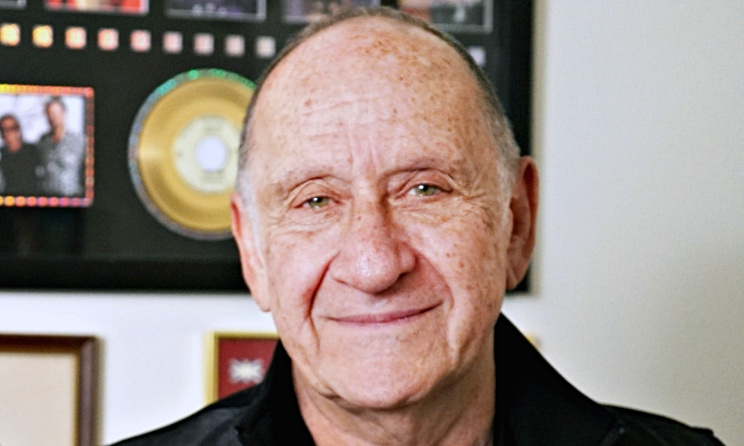The Orchard’s Richard Gottehrer: Tech has always disrupted the music business
Global music distribution company The Orchard has set its sights on South Africa, drawn by the rich musical tapestry in the country and an explosion of DIY artists creating ground-breaking music that is being noticed around the globe. Recently, at the Cradle of Humankind near Johannesburg, Music In Africa met with Richard Gottehrer, the well-known American songwriter, record producer and label executive who in 1997 co-founded The Orchard with his long-time business partner Scott Cohen.
 Richard Gottehrer.
Richard Gottehrer.
Gottehrer’s career began as a songwriter in the 1960s at the Brill Building – the famous Manhattan office space that housed music industry offices and studios where some of the most popular American songs were written. In 1966, he co-founded Sire Records alongside Seymour Stein, which became a pivotal force in the emergence of the new wave genre. The record label later propelled the careers of iconic artists such as Ramones and Talking Heads.
A music industry visionary, Gottehrer shared his vision behind The Orchard’s activities in Africa – his ambition focused on nurturing and elevating the African music industry through innovative products targeting local music makers.
“I came to South Africa to help develop and support the growth of South African music throughout the world, using what we’ve learnt from 26 years of development at The Orchard globally and understanding how localised music – music from almost anywhere – can reach audiences everywhere,” he said.
The South Africa office, led by Mpumi Phillips, acts as a hub focusing on local music and bolstering further the company’s presence in countries like Nigeria, Kenya and Francophone Africa. This expansion underscores The Orchard’s belief in the potential of African music and the immense talent present on the continent.
“We want to support this new focus area, which is African music,” Gottehrer said. “We have a presence in Nigeria, Kenya and French-speaking Africa, which bounces back to France. Now, we’re making South Africa a major focus as well. We have somebody here, Mpumi Phillips, whom we hold in high regard. She’s a true professional and knows the business inside out. She’s a person who gets things done.”
In June, The Orchard renewed its partnership with Music Business Academy for Africa (MBA Africa) to help develop the next generation of music industry executives on the continent and guide independents to navigate the constantly evolving music business at home and abroad.
“MBA for Africa’s Talent Project is essentially a school for 10 select students. They are taught to make a record from start to finish: recording, marketing, artwork, all of that. Then, The Orchard actually distributes the record globally. Over the past two years, we’ve sponsored this programme within the school – hich provides financial resources to enable the students to create their own records.”
At 83, Gottehrer has witnessed first-hand some of the most transformative moments in the history of the modern music industry. He began his journey as a songwriter at a young age, deeply influenced by iconic figures like Elvis Presley and Jerry Lee Lewis. A founding member of The Strangeloves – best known for the megahit ‘I Want Candy ’ – he saw the music industry shift numerous times to what it has become today. The transition to tape machines and multitrack recording allowed for more complex and layered music production, and the introduction of FM totally altered the music business model of the time.
“The change in business comes from technology,” he says. “When we started producing, you had to know what you were doing because you were dealing with mono. Maybe you had a second track that you could put the voice on. As the business grew, it went to four tracks, eight-track recording, 16 track, 24 track, and 48. You could sync up machines so you could have multiple parts.
“And then a miracle happens. The miracle was FM radio. When FM radio stations come along, what do they do? They play music in stereo. The albums were always in mono. Except for a few, albums would be done in stereo. Those were for people who had expensive systems. They could listen to them at home. So, you’re making singles that still run on AM radio, but you can now make an album and get it played on radio. And that was the big difference.
“So, it’s technology that’s changing things, making the business different. Before that, you were selling singles and maybe you could sell an album. Not really, if you were an artist. I mean, Frank Sinatra would sell albums, obviously. Nat King Cole sold albums. But for the most part, albums weren’t selling. But in came stereo and companies started selling albums and manufacturers started making stereo equipment. The studios got bigger. People like me, kids essentially, were able to go into these rooms and create magic on four-track machines.”
And then the 1990s ushered in the first moments of the digital music revolution, and The Orchard was there to try its hand at the new paradigm – in the process, and perhaps unknowingly, contributing to the transformation and development of what the future music landscape would look like.
Gottehrer’s detailed account of how The Orchard struck gold:
“In 1995, nice people started playing around with computers. Obviously, it was earlier than that, but really, the individual started getting involved in the mid-1990s, right? So, Scott Cohen and I had formed a record company. We’re putting out records and we see that as we’re trying to promote our records, it’s hard because we’re small; we can’t pay very much to get it on radio. So we start looking on this new device called a computer. We have one or two in our office, and it wasn’t even big-screen stuff, and it’s before broadband. So, what do we do? We find on the internet that there are a few record stores. How can there be record stores online? So, we call them up and we try to find out how to get our records into those record stores. But they’re so sorry: ‘We can’t take them.’ I said, ‘Well, that’s probably against the law. But their answer was, ‘No, no, no, nothing personal. You have to understand that we’re not really a record store. We don’t have all these records. What we are is virtual. Now, first of all, I’ve never heard the word virtual in terms of music. So I asked, ‘How?’ And they told me that their whole backend was supplied to them by a place in California. And the place’s name was Valley. Valley Media. It was the largest one-stop supplier of music in the entire country.
“So we take a trip out there and we came up with the idea, because we saw there was no independent music. All we saw was major record label music and there was like a quarter of a million titles they said they had. So, we go to these people and say to them, ‘Listen, we know what you’re doing. Would you be willing to work with us? We have this company that’s developing independent artists called The Orchard.’ That was it. We called it The Orchard, it was on Orchard Street in Manhattan. A storefront with a basement ... After two hours of talking to them, they said, ‘Look, you’re one of us, we’ll do this with you. And they said, ‘But also, we don’t want to deal with the independents. Why don’t you deal with them? And we’ll tell all these stores that if any independent wants to come in, they have to come in through your company, The Orchard.’ Well, that’s fantastic...
“So we go back to New York and we recreate the warehouse that they had out there in a minimal way in our basement. And we start taking in clients and we put one clause in the contract that was not deceptive. It was reasonable. We started thinking, ‘Gee, if this is happening, what else will happen? Hmm. So, the big record companies told us that CDs were digital. They’d play on digital devices, but that’s not what digital is. Digital is something imaginary, something that will happen. It’s coming. So, we put a clause in the contract saying you’ll also agree to allow us to distribute your music digitally. We thought that was personally fine because they really just wanted to get into these internet stores. They agreed and we continued and we waited until we knew it was coming. It didn’t fully come. But by 2001-02, iTunes came and we had about 150 000 titles that we could offer them digitally.”
In 2015, Sony Music Entertainment acquired The Orchard for more than $200m but Gottehrer says that since then Sony has made a point to keep up with the original independent ethos that gave the company its success in the first place.
“I started as an independent. That stream, it just keeps going. And just like those people that made the deal with us because they liked the past, they agreed to allow The Orchard to be the gateway to the independent stores. That history leads straight to when Scott and I looked on the internet and said, ‘Hey, let’s start this company. Let’s see what happens.’ We had no idea what we were doing. We literally learnt on the job.
“We’re a bunch of independents with the biggest record company in the world running us. Turns out it’s a great partnership. Sony understands what we do and how it relates to what they do, and they continue to allow us to operate with this independent attitude. That’s now what the business is truly like because artists can go anywhere. They can put their music up themselves online.
“What I would say is that with The Orchard, we are you. You’re probably a better songwriter than I am now. I don’t know that I can make records anymore the way I used to, but you can. And if you want to call me up and say, ‘What do you think of this from your experience, do you have any advice?’ Yeah. And you can get all that. And this is what The Orchard gives to people all around the world. So, my greatest achievements would be writing ‘I Want Candy’ and starting The Orchard.”
Learn more about The Orchard here.



































Comments
Log in or register to post comments